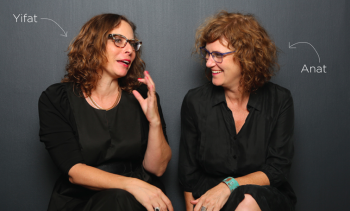By Professor Dennis R. Shaughnessy
Playing video games has become a pervasive activity for young people. Critics suggest that too much gaming can lead to mental illness, with the UN now recognizing excess gaming as a form of mental illness. Other critics suggest that ultra-violent games, especially so-called “first person shooter” games, can lead to desensitizing players and enabling real violence against others. While addiction and violence continue to be much debated topics, there’s little doubt that video games lead to a wide variety of unintended consequences.
A newer and more positive look at video games and gaming is in the growing segment for games that are designed intentionally to achieve social good.

Founders Yifat and Anat, founders of Toya Play. Photographed by Yanai Yehiel
The non-profit organization Games for Change supports game creators, educators and social innovators in developing games that empower children and young people to learn, improve their communities and contribute to making the world a better place. From games that create awareness of mental illness to others that focus on the realities of global conflict and poverty, the “games for good” segment of the video game industry is a compelling counterpoint to the violent and arguably addictive side of the gaming world.
Examples of free games supported by Games for Change include:
ThirdWorldFarmer (agriculture and poverty)
A Closed World (LGBTQ youth)
Against All Odds (global refugee crisis)
Toya is an Israeli business that develops multi-player video games that aim to “inspire and motivate” young girls to realize their full potential, unconstrained by gender stereotypes.
The company founders, Anat Shperling and Yifat Anzelevich, refer to studies that when boys and girls are four years old they both want to be president, but by the time they are twelve years old, boys still want to be president but girls now want to be models. Our cultures too often perpetuate gender inequality, resulting in girls not reaching their full potential. Designing and marketing video games that reject gender stereotypes and instead empower girls and young women is the social impact mission of this young for-profit business.
 Toya’s games allow girls to become the hero while revealing the life stories of exceptional women. One is a multi-player game on the Minecraft platform that is dedicated to the specific and diverse needs of girls. Others engage girls in science and technology, intending to lead to more girls studying in STEM fields.
Toya’s games allow girls to become the hero while revealing the life stories of exceptional women. One is a multi-player game on the Minecraft platform that is dedicated to the specific and diverse needs of girls. Others engage girls in science and technology, intending to lead to more girls studying in STEM fields.
While video games that emphasize positive interaction and outcomes is not new, there are exciting new directions being pursued within the gaming world that are based in conscious social innovation and designed for genuine social impact.


